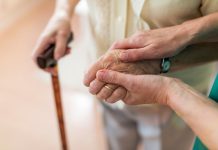
In this edition of Science Mitten, we take a look at studies about why birds collide into windows at McCormick Place in Chicago, how much caffeine can actually help you accomplish tasks, and how the microorganisms in babies’ stomachs can impact neurological development.
Darken a window, save a bird
Turning off half the lights at Chicago’s McCormick Place convention center resulted in dramatically fewer birds slamming into the buildings during spring and fall migration periods, according to a study in the Proceedings of the National Academy of Sciences and co-authored by University of Michigan evolutionary biologist Benjamin Winger. Winger and researchers from Cornell University and Colorado State University teamed up to study what influenced the number of bird collisions and found the amount of lighting at the mammoth convention center was the biggest determinant. On nights when the lighting was cut by half, the scientists assert, they observed 11 times fewer collisions during spring migration and six times fewer in the fall.
Babies follow their gut, literally
An examination of what’s in the belly of your infant or toddler may explain how their brain reacts to perceived danger and whether they experience excessive anxiety, a study by Michigan State University and University of North Carolina researchers says. The findings, published in the journal Nature Communications, assert that the composition of microorganisms in babies’ stomachs can impact neurological development. The scientists analyzed babies’ stool samples and assessed their reaction to a stranger entering a room wearing a Halloween mask. More fearful kids had more of certain bacteria in their guts than the calmer children.
The limits of caffeine
Those cups of coffee or cans of Red Bull only go so far in helping sleep-deprived people function properly, according to a Michigan State University study published in the Journal of Experimental Psychology. MSU researchers say caffeine does help people stay awake by increasing energy, but it didn’t help similarly tired people to efficiently or successfully complete a series of tasks in a study of 276 participants at the school’s Sleep and Learning Lab. Psychology professor Kimberly Fenn, the lead researcher, says caffeine may help you not fall back to sleep, but it doesn’t “prevent the sort of procedural errors that can cause things like medical mistakes and car accidents.”
This story is featured in the August 2021 issue of Hour Detroit magazine. Read more stories in our digital edition.
|
|
|









